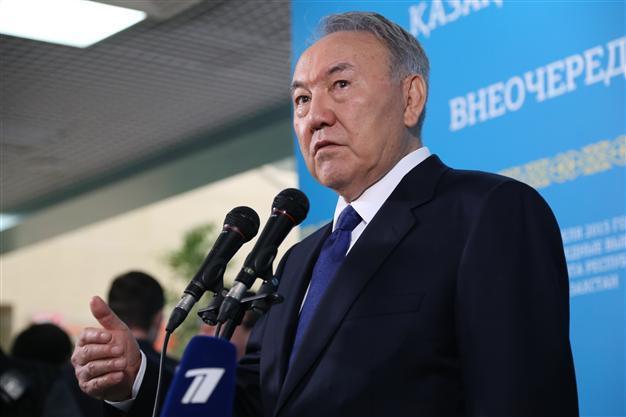Crushing re-election extends Kazakh president's quarter-century rule
ASTANA - Agence France-Presse

AA Photo
Kazakhstan's President Nursultan Nazarbayev extended his quarter-century rule over the oil-rich, ex-Soviet republic with a crushing 97.7 percent of ballots in an election where opposition parties did not field a candidate, officials said April 27.Nazarbayev, who has run the huge Central Asian country since before the Soviet breakup in 1991, will start a fifth term. The Central Election Commission claimed a record turnout of 95.22 percent in April 26 polls.
Speaking in the capital Astana shortly after exit polls pointed to nearly total voter support, Nazarbayev said he had a mandate for his plans to make Kazakhstan one of the thirty most developed countries in the world.
"Without this level of general trust it would be difficult to work on realising such aims. The record high turnout at the vote demonstrated the unity of Kazakhstan's people, their desire to live in a stable state and their support for the program I put forward before them," he said.
However, Nazarbayev tolerates little dissent and has clamped tightly down on media and civic freedoms.
The country's deeply marginalised opposition did not have a candidate in the election. The only two other contenders, figures widely seen as pro-government, scored less than 3 percent between them.
The strategically located country, bordering both Russia and China, has never held an election deemed free and fair by international monitors. Observers from the Organisation for Security and Cooperation in Europe (OSCE) were due to give their assessment of the latest polls later April 27.
Nazarbayev's victory was celebrated in cities across the country with fireworks and flash mobs, while some babies born in hospitals on Sunday and Monday were given election-themed names.
Many citizens standing in long, snaking queues at polling stations in Astana and in the largest city Almaty on Sunday had cited a civic duty to vote, although others complained of having been pressured to go to polling stations by employers -- a common practise across parts of the ex-Soviet Union.
"Elections in Kazakhstan resemble political theatre," Dosym Saptaev, director of the Kazakhstan Risks Assessment Group, a think tank based in Almaty, told AFP.
"What matters more is what will happen next. Will we see genuine political reforms to create the basis for political life without Nazarbayev? How will the government fix the economy?"
Economic issues have come to the forefront in recent months in Kazakhstan, which is the most prosperous of the five ex-Soviet Central Asian states.
Kazakhstan's domestic producers have been laying off workers as they struggle to compete with Russian imports made cheaper by the dramatic weakening of the sanctions-hit ruble.
Kazakhstan banned a number of Russian foodstuffs in March and April, citing standards violations, and has also restricted imports of Russian fuel. Moscow, traditionally viewed as a strong ally of the republic, implemented tit-for-tat measures this month.
Depressed prices for Kazakhstan's main export, crude oil, have created a headache for the government, with ratings agency Standard and Poor's downgrading the country's sovereign credit rating to almost junk territory earlier this year.
Nazarbayev claimed victory in the previous presidential election, in 2011, with 95.5 percent of the vote. Sunday's ballot -- called a year ahead of schedule -- was the fifth he has contested.
In its interim report on the vote, the Organisation for Security and Cooperation in Europe (OSCE) raised concerns about Nazarbayev's "institutional advantage".
While Nazarbayev's posters and billboards were "visible throughout the country," the other two candidates have distributed "almost no campaign materials," the OSCE said.
The OSCE sent nearly 300 observers to the vote and was expected to deliver its verdict on the poll at around 0900 GMT on April 27.
Over 9.5 million people in the ethnically diverse country were eligible to vote at over 9,000 polling stations across the country, according to the CEC.
















